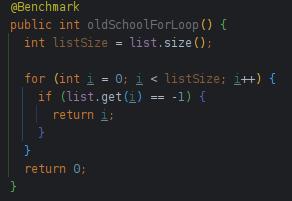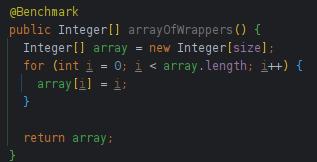
⚠️#Java performance comparison⚠️
I decided to compare the performance of different collection iteration options. In particular:
📍 for loop
📍enhanced for loop
📍for loop with an Iterator
📍stream
Details🧵👇
I decided to compare the performance of different collection iteration options. In particular:
📍 for loop
📍enhanced for loop
📍for loop with an Iterator
📍stream
Details🧵👇
To test it, I have implemented 4 Benchmark methods, each iterating through list of positive integers and checking them for equality to -1. And at the end of the method, it returns 0 since non was found. In short: Just iterating through the entire collection. 







Results:
✅for (Integer i : list) 781 ns/op
✅for (int i = 0; i < listSize; i++) 785 ns/op
✅while (iterator.hasNext()) 788 ns/op
❌list.stream() ns/op 3256 ns/op 4x slower 😱👀
✅for (Integer i : list) 781 ns/op
✅for (int i = 0; i < listSize; i++) 785 ns/op
✅while (iterator.hasNext()) 788 ns/op
❌list.stream() ns/op 3256 ns/op 4x slower 😱👀
The result shows that loops perform the same, but the stream is 4 times slower than loops.I think it's mainly slower because of the overhead added by lambda instantiations. 

Conclusion: If your only goal is performance, use loops, but in all other cases, use streams for readability. And let's hope that newer versions of Java can improve stream performance.
Code as usual in my GitHub repo:
github.com/xp-vit/java-lo…
Code as usual in my GitHub repo:
github.com/xp-vit/java-lo…
That's a wrap!
If you enjoy my #Java performance comparisons:
1. Follow me @xpvit for more Java, Cloud, and Linux knowledge.
2. RT the tweet below to share this thread with your audience
If you enjoy my #Java performance comparisons:
1. Follow me @xpvit for more Java, Cloud, and Linux knowledge.
2. RT the tweet below to share this thread with your audience
https://twitter.com/421103460/status/1626899895499063297
• • •
Missing some Tweet in this thread? You can try to
force a refresh






